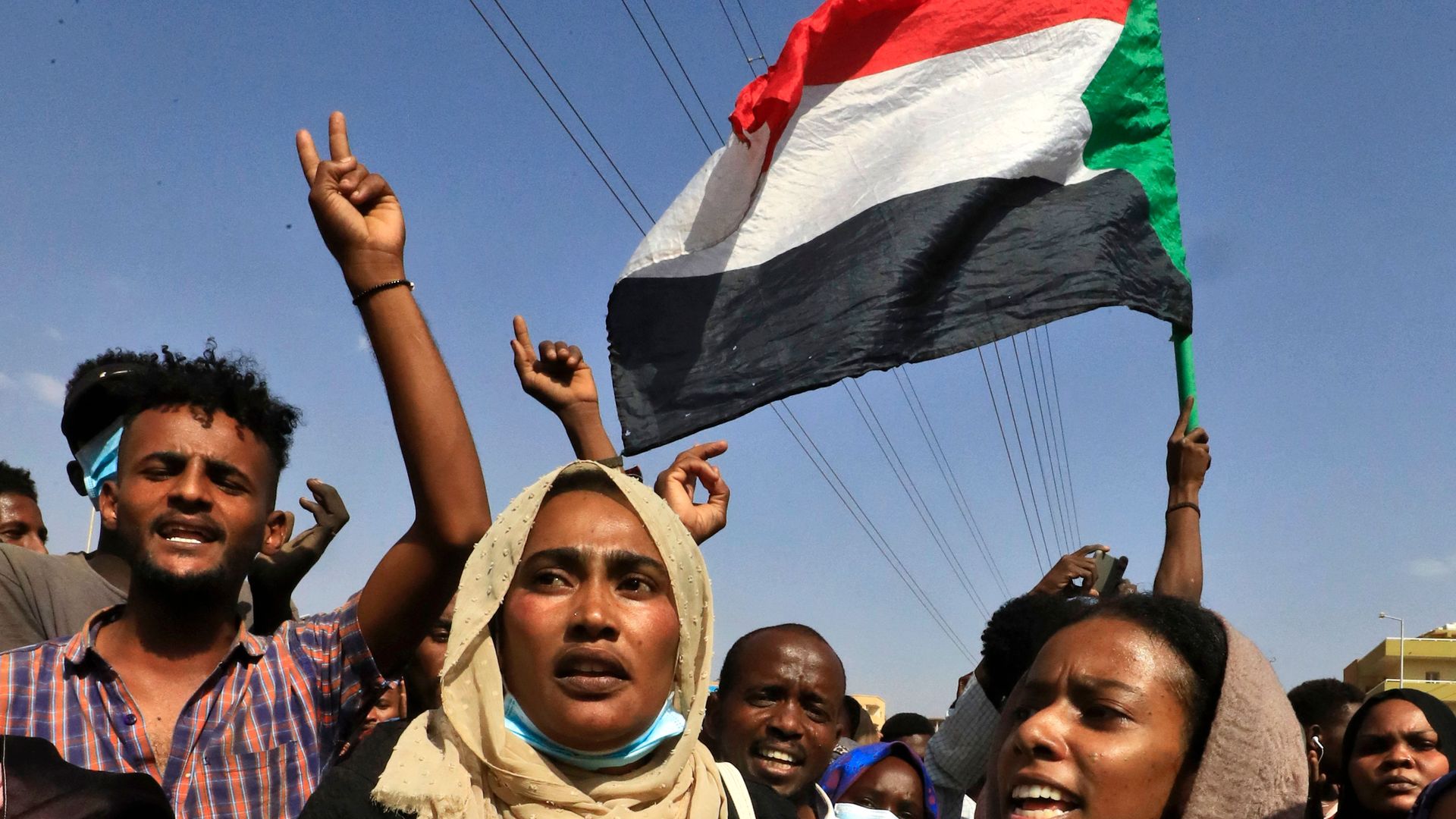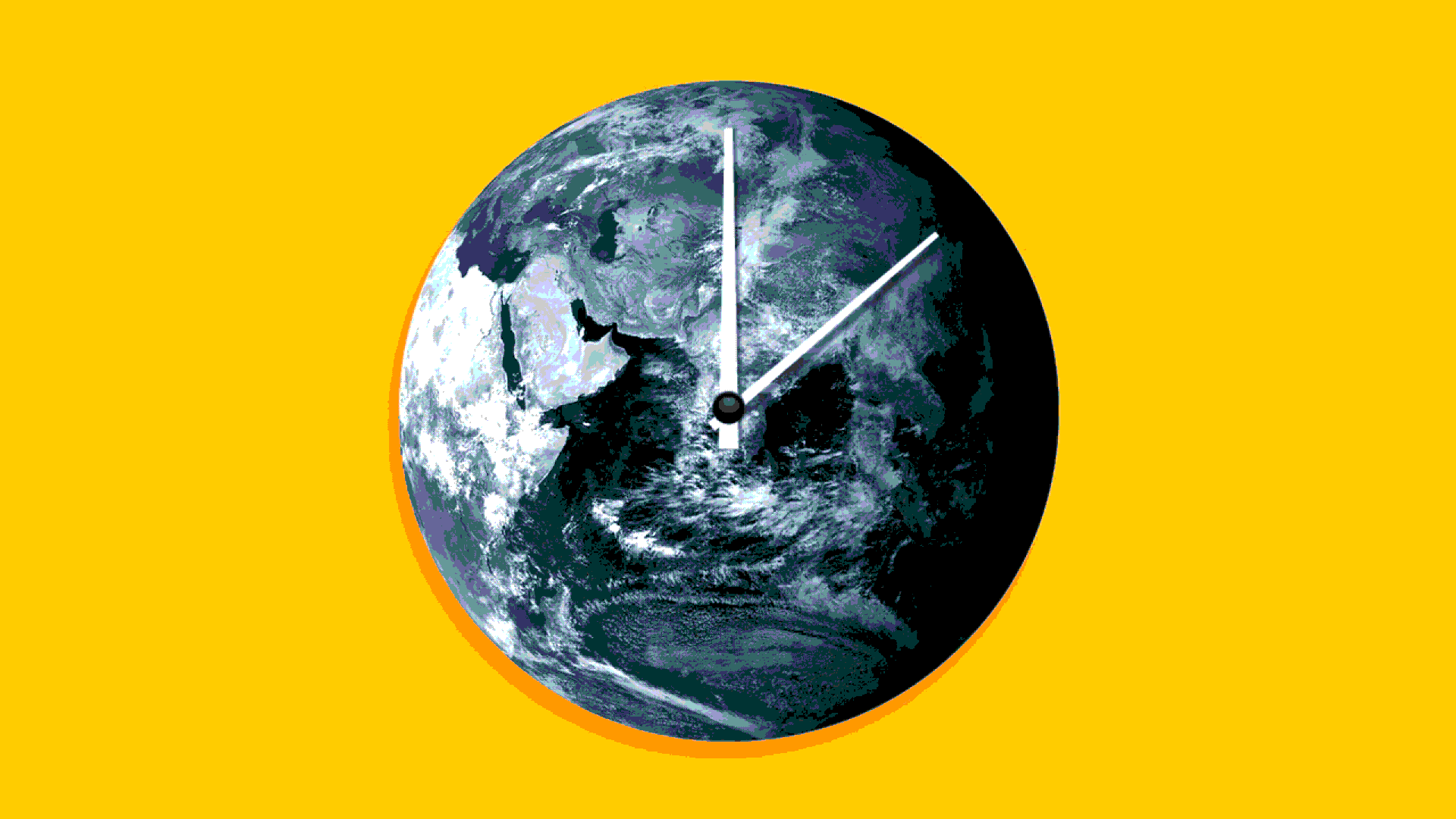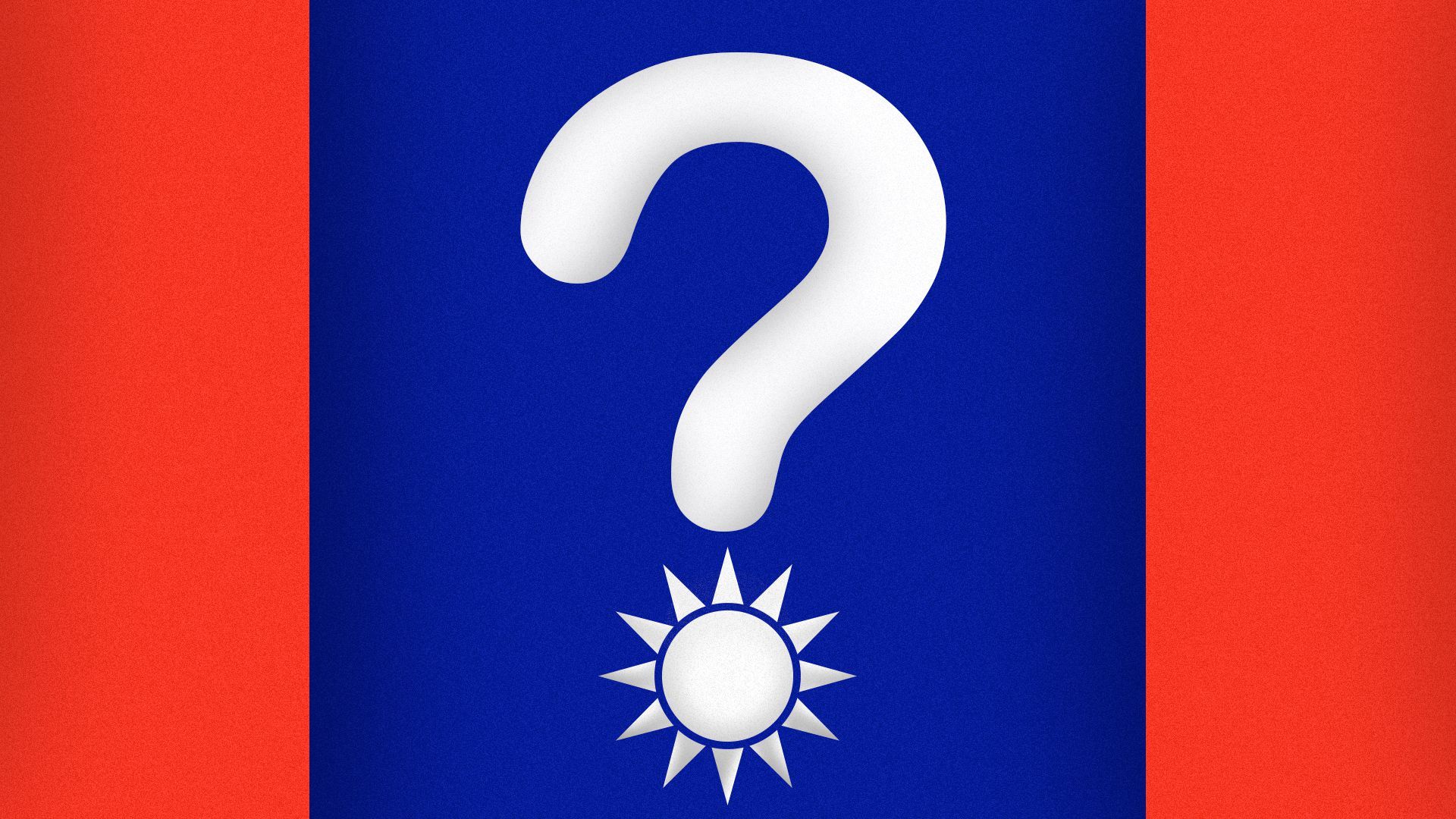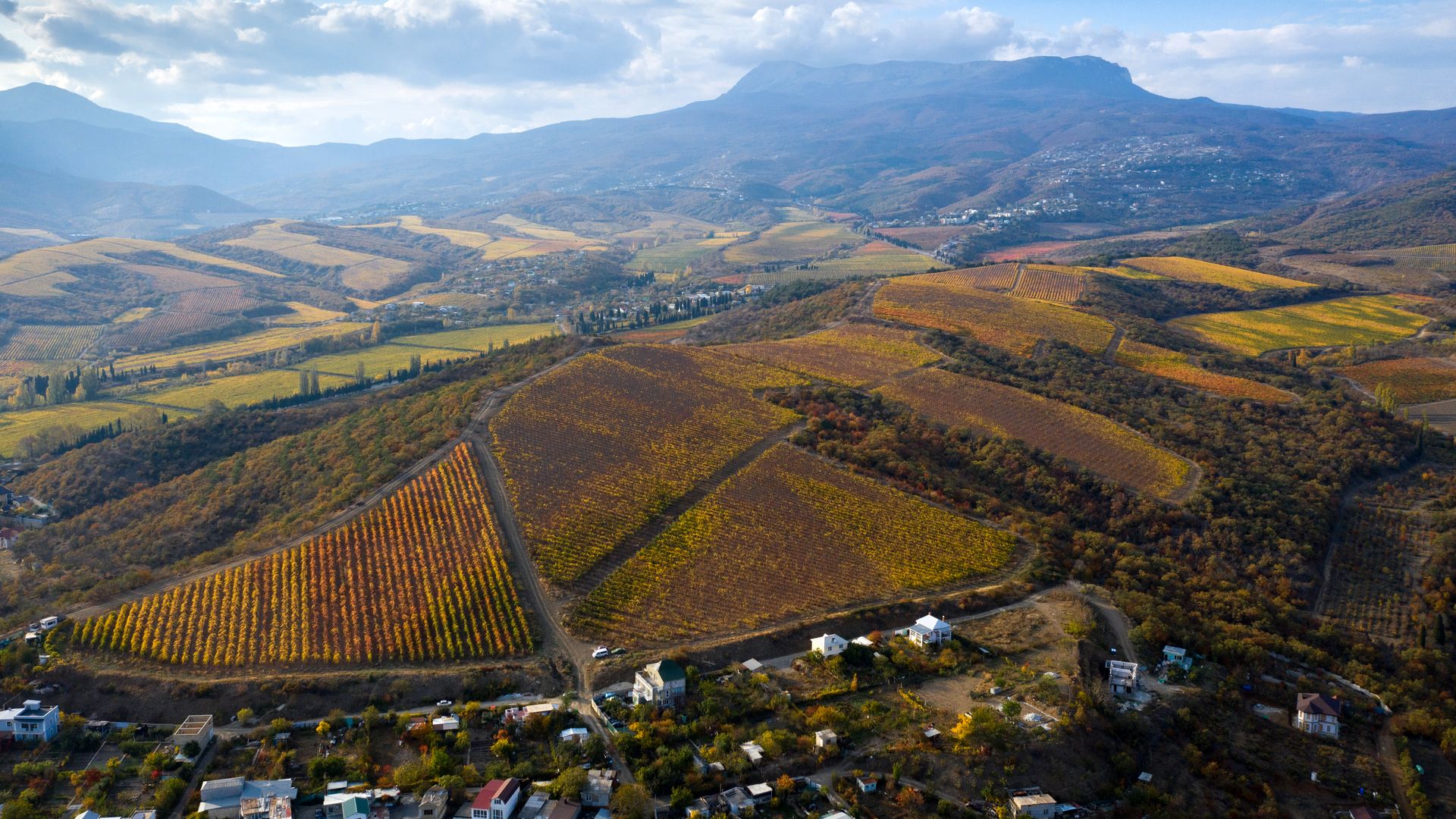| |
| |
| |
| Presented By Babbel |
| |
| Axios World |
| By Dave Lawler ·Oct 25, 2021 |
| Welcome back to Axios World. - We're returning to Sudan this evening (1,661 words, 6 minutes) in light of today's military coup.
|
| |
| |
| 1 big thing: U.S. suspends aid to Sudan over coup |
 |
|
| Protesting the coup in Khartoum. Photo: AFP via Getty |
| |
| The Biden administration has frozen a $700 million aid package to Sudan after a military coup on Monday threatened to end the country's transition toward democracy, Axios' Barak Ravid and I write. Driving the news: At least three protesters have been killed and dozens wounded in the chaotic scenes that followed this morning's announcements from Gen. Abdel Fattah al-Burhan, the head of Sudan's ruling council, dissolving the government and declaring a state of emergency. - Prime Minister Abdalla Hamdok and other civilian leaders were arrested, apparently after Hamdok refused to endorse the coup.
- Amid the confusion, Sudan's Information Ministry called on Sudanese people to "use all the peaceful means to recover their revolution from any kidnapper." That call that was headed by thousands, some of whom erected barricades in the capital.
- Security forces reportedly used live ammunition during the ensuing demonstrations. TV and radio stations went dark, and internet outages were reported.
Behind the scenes: The coup took place just hours after a meeting in Khartoum between U.S. envoy Jeffrey Feltman, Hamdok and Burhan aimed at finding a solution to the standoff between the military and civilian wings of the government. - Feltman departed Khartoum after the meeting, but by the time he arrived in Doha to catch a connecting flight back to Washington the first reports about the coup had started to emerge.
- During a separate meeting with Feltman on Sunday, Burhan mentioned the possibility that elements within the Sudanese army might take action due to tensions with the civilian government, according to sources briefed on the meeting.
- Feltman told Burhan that the U.S. would respond forcefully, with measures that would include the suspension of all aid to Sudan and the freezing of many aspects of the bilateral relationship.
The latest: State Department spokesman Ned Price said Burhan's decision to "violate Sudan's Constitutional Declaration and abandon the democratic aspirations of the Sudanese people" would jeopardize "our entire relationship" with Sudan. - Price called on the military "regime" to immediately release Hamdok and other political leaders, restore the transitional council, and avoid the use of force against protesters.
- Feltman has not flown back to the U.S., but it's unclear whether he will return to Sudan.
- The $700 million aid package that has been paused was promised to Sudan last year after the government agreed to start a normalization process with Israel.
The big picture: A joint military-civilian council took power after dictator Omar al-Bashir was toppled in 2019 to oversee a three-year transition to democratic elections. - Control of the council was supposed to pass from Burhan to a civilian in the coming weeks, but he had been claiming in the lead-up to the coup that squabbling between civilian politicians was endangering the revolution.
- Also setting the stage for the coup was a pro-military sit-in outside the presidential palace. Still, tens of thousands of people marched in Khartoum last Thursday in defense of the democratic transition.
Worth noting: In an interview with Axios last week, one of the most high-profile civilian members of the ruling council, Mohamed Elfaki Suleiman, accused Burhan of seeking to effectively take power without resorting to a coup. - Suleiman was among the politicians reportedly arrested today.
|
    |
| |
| |
| 2. WHO backs African effort to replicate Moderna vaccine |
 |
|
| Illustration: Shoshana Gordon/Axios |
| |
| Moderna's vaccine is one of the most effective tools available to fight COVID-19, but it has been distributed mainly to wealthy countries, and the Massachusetts-based company now seems to be prioritizing rich-world boosters over expanded access in the developing world. What's happening: Scientists in Cape Town are trying to reverse-engineer the vaccine using publicly available information in order to distribute a version of it in Africa — and they now have the backing of the WHO. - Afrigen Biologics managing director Petro Terblanche told the AP that his company hopes to have a version of the vaccine ready for testing within a year and would also share its know-how about how to produce it.
- Some argue that this shouldn't be necessary since U.S. taxpayers largely bankrolled the development of the vaccine and the government holds many of the patents behind it.
- For now, the Biden administration is trying to press Moderna to increase the supply to developing countries. The company claims it will dramatically increase shipments to developing countries next year.
State of play: Just 5% of Africans are fully vaccinated — a rate the U.S. crossed in February. |
    |
| |
| |
| 3. Countdown to COP26 |
 |
|
| Illustration: Eniola Odetunde/Axios |
| |
| After 12 years of fits and starts, industrialized nations on Monday put forward a detailed plan to provide at least $100 billion annually in climate aid to developing countries starting by 2023, Axios' Andrew Freedman writes. Why it matters: The plan, presented by representatives of Canada and Germany, is aimed at defusing one of the biggest sources of tension at next week's COP26 climate summit, which is the failure of industrialized nations to follow through on their financial commitments. Yes, but: The original goal set in 2009 was for the countries most responsible for climate change to date, such as the U.S. and European Union, to pay developing countries to help them withstand climate impacts and develop renewable energy resources. - The $100 billion was supposed to be mobilized beginning in 2020, and climate vulnerable nations are seeking back payments.
- However, some developed nations, such as the U.S., are opposed to making up for such a shortfall.
What else to watch at COP26: - Whether Democrats' big social spending and climate package moves forward ahead of the summit, or whether Biden shows up empty handed.
- Whether China or India, the world's first and third-biggest greenhouse gas emitters, will unveil updated emissions-cutting pledges.
- Whether G20 nations meeting in Rome just ahead of COP26 can reach an agreement on commitments to phase out coal-fired power — and if so, whether it's specific. Potential language on deforestation is also on the table.
The latest: |
    |
| |
| |
| A message from Babbel |
| 3 reasons to subscribe to Babbel Live |
| |
 |
| |
| A Babbel Live subscription lets you: - Enjoy a classroom experience — from home — with top language teachers.
- Get feedback from teachers and just five other students in real-time.
- Take as many classes as you'd like for just one monthly price.
Start learning your way and get 65% off. |
| |
| |
| Bonus: Where in the World |
 |
|
| Screengrab via Apple Maps |
| |
| Today we're visiting five cities that glow brightly from space. Can you name them? Scroll to bottom for answers. |
    |
| |
| |
| 4. Global news roundup |
 |
|
| Recep Tayyip Erdoğan. Photo: Adem Altan/AFP via Getty |
| |
| 1. Turkish President Recep Tayyip Erdoğan has walked back threats to expel 10 Western ambassadors (including from the U.S.) who had called for the release of jailed philanthropist Osman Kavala. 2. A former top Saudi intelligence official claimed in a "60 Minutes" interview that Crown Prince Mohammed bin Salman had once discussed killing the kingdom's former ruler with a poisoned ring. 3. A U.N. flight carrying aid workers to the capital of Ethiopia's war-torn Tigray region had to abort its landing on Friday due to a government air strike in the area, a sign of the current escalation in the fighting and the difficulties in providing lifesaving aid. 4. After rumors spread on social media earlier this month that the Quran had been threatened at a pavilion assembled to celebrate a Hindu festival, spiraling mob violence against Hindus spread across Bangladesh, the BBC reports. - Meanwhile in India, Hindu nationalist groups linked to the ruling BJP that have been flagged internally for spreading disinformation and anti-Muslim hate have been allowed to remain on Facebook, per the WSJ.
|
    |
| |
| |
| 5. Inside Biden's Taiwan flubs |
 |
|
| Illustration: Aïda Amer/Axios |
| |
| Twice this year, President Biden has blurted out commitments that the U.S. is prepared to defend Taiwan against a Chinese invasion — forcing the White House to walk back his statements and leading to confusion over a high-stakes national security policy, Axios' Zach Basu and Jonathan Swan write. The big picture: The U.S. government has a long-running policy of "strategic ambiguity" on Taiwan. Within this sensitive construct, every word is delicately parsed. - But in an interview with ABC in August, Biden included Taiwan in a list of countries the U.S. had a commitment to protect.
- And on Thursday night, in CNN's town hall, Biden responded "yes" when asked by an audience member whether he could "vow to protect Taiwan."
- Both times, the White House has insisted the president's statements do not reflect a change in policy.
Behind the scenes: A source who has discussed these sensitive matters with top Biden officials said he believes Biden has been accidentally revealing his true views — that Taiwan is too strategically important to the U.S. for China to seize by force. - Meanwhile Matt Pottinger, the former deputy national security adviser under Donald Trump, said Biden's recent statements about Taiwan have been "helpful" as "a de facto signal to Beijing not to underestimate us."
- Chris Johnson, a former top CIA China analyst, said it's unclear whether Biden's statements are strategic or accidental, but "the result in Beijing will be the same. ... The Politburo will interpret it as a unilateral change in the U.S. position on the cornerstone underpinning the bilateral relationship."
Go deeper |
    |
| |
| |
| 6. Cricket world cup: More than a sport |
Afghan captain Mohammad Nabi cries as the anthem concludes. Screengrab via TwitterThe captain of Afghanistan's national cricket team broke down in tears during the national anthem ahead of today's blowout win over Scotland in the T20 World Cup. - The fact that the national anthem was played — and an enormous national flag displayed on the pitch — were both potent symbols, as they represent the republic that fell to the Taliban.
- Nonetheless, a Taliban spokesman congratulated the team on a "historical win."
A day earlier, Pakistan upset India in the first match in two years between the cricket mad countries, who happen to be nuclear-armed rivals. - Few sporting matchups draw such a large audience or so inflame national passions. Pakistan's first victory over India in a World Cup match was cause for nationwide celebration.
- But the image that spread like wildfire after the game was a post-match embrace between the teams' captains.
|
    |
| |
| |
| 7. Stories we're watching |
 |
|
| Autumn arrives at a vineyard in Crimea. Photo: Sergei Malgavko/TASS via Getty |
| |
- U.S. releases new rules for foreign travelers
- 21-day quarantine for non-vaccinated Olympians
- Barbados ditches the queen
- U.S.-China tech race
- U.S. will let private citizens sponsor Afghan refugees
- U.S.-Mexico border arrests reach all-time high
- Ivory trade accelerated "evolution" of tuskless elephants
Quoted: "I think the mosque looks good either way, but what say do we have anyways?" — Ali, a farmer in northwestern China, on the government's decision to remove the domes and minarets from his local mosque to make it appear more Chinese. That's happening all over the country, per NPR. |
    |
| |
| |
| A message from Babbel |
| 3 reasons to subscribe to Babbel Live |
| |
 |
| |
| A Babbel Live subscription lets you: - Enjoy a classroom experience — from home — with top language teachers.
- Get feedback from teachers and just five other students in real-time.
- Take as many classes as you'd like for just one monthly price.
Start learning your way and get 65% off. |
| |
| Answers: Bangkok (1), Ho Chi Minh City (2), Singapore (3), Jakarta (4), Hong Kong (+ Macau and Guangzhou). |
 | | It'll help you deliver employee communications more effectively. | | |













No comments:
Post a Comment